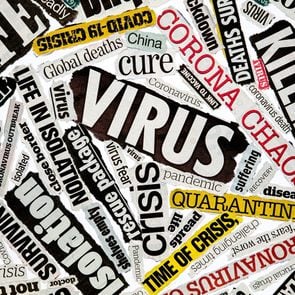Could Protection From COVID Soon Be Available Through a Nasal Spray?

Multiple companies, including Canada's SaNOtize, are developing nasal sprays that could change how we fight the virus. Here’s what you need to know.
Why are nasal swabs used to detect COVID-19? Since the virus typically enters the body through the nose, the nasal passage is the first place its particles can be found. So, what if there could be an antibody response in the nose to stop the virus from spreading to the rest of the body? A special nasal spray may be able to do just that—and many Canadian researchers are working to develop one.
Vancouver-based research and development company SaNOtize is currently testing its nitric oxide nasal spray to prevent and treat early cases of COVID. “We call it the hand sanitizer for the nose because you use it to basically disinfect your nose,” says Gilly Regev, CEO and one of the co-founders of SaNOtize. While the SaNOtize spray is a “preventative treatment,” not a vaccine, according to Regev, researchers at various Canadian universities are working on nasal sprays that can act as COVID vaccine booster shots.
At Hamilton’s McMaster University, experts are studying the immune system to learn how an inhaled or nasal spray vaccine could stimulate a protective “spider web” mechanism in the human body that can trap and kill the virus. Researchers at uOttawa are looking at COVID’s viral spike proteins to develop a nasal spray that can trigger an immune response in the body before the virus enters. And researchers at the University of Waterloo are working on a nasal spray that’ll create a virus-like particle to generate an immune response that’ll build immunity and prevent the severity of symptoms.
To learn more about COVID-fighting nasal sprays, we reached out to Regev as well as Matthew S. Miller, an associate professor at McMaster’s Michael G. DeGroote Institute for Infectious Disease Research and the lead author on the university’s nasal spray study, and Roderick A. Slavcev, a professor at the University of Waterloo’s School of Pharmacy who specializes in vaccine design.
What’s the latest with COVID in Canada?
A year and a half into the pandemic, Canada has over 70 per cent of its population fully vaccinated and about 4,000 new cases of the virus a day—down from its peak of nearly 9,000. Recently, cases of COVID have been on the rise, there’s been debate over the necessity of COVID booster shots, and the country is facing up to four variants of the virus.
What’s SaNOtize nasal spray all about?
The SaNOtize nasal spray is “the only nasal spray that has actually gone through a proper placebo control phase two trial,” says Regev. The blinded trial used saline as the placebo and SaNOtize spray used as the treatment. “We have shown that we reduced viral load 16 times more than the control after using the spray for 24 and 72 hours,” says Regev.
The spray releases nitric oxide into the nose to prevent a potential infection and eradicate a virus—whether that be COVID, influenza, or another respiratory virus. Regev says SaNOtize can be used twice a day to prevent the virus, and up to six times a day to reduce the viral load of those who have already contracted the virus.
SaNOtize has been approved to sell in Europe, Israel, Bahrain, and Thailand, and Regev says she’s hoping it will be approved by Health Canada by the end of the year.
Why a nitric oxide spray?
Nitric oxide is a compound that the body naturally produces, says Regev. “It’s our first line of defense against infection in the body.” Nitric oxide has antimicrobial properties, so it’s able to kill bacteria, viruses and fungi.
Is nitric oxide safe to use every day?
“The dose of nitric oxide in the spray is so low,” says Regev. “We haven’t seen any significant side effects at all—not in the trials, and not in the report from the market.”
SaNOtize trials have included 200 participants and the company has sold about 100,000 units to the market. “We’re still doing testing with specific populations and children, but because we’re using compounds that are allowed in food, there shouldn’t be any issues,” says Regev. (Find out what happens if you get COVID-19 after being vaccinated.)
What about the COVID nasal spray vaccines that are being researched? What are their benefits?
Researchers are working to create vaccine nasal sprays for COVID. Although intermuscular and nasal vaccines are equally effective, the added benefit of a nasal spray is that they are administered directly into the respiratory system, so they stimulate immunity at the exact place the infection typically occurs, says Miller. Nasal spray vaccines may also generate a more immediate immune response than intramuscular injections, according to Slavcev.
Another benefit of a nasal spray is that much less of the vaccine is typically needed to stimulate the same level of protective immunity. “It’s what’s called a dose-sparing effect,” says Miller. That means one dose of an intramuscular injection can vaccinate as many as 100 people through a nasal spray.
How can a vaccine nasal spray fight COVID-19 exactly?
Nasal sprays that elicit an immune response in the respiratory tract are not new, says Miller. For example, there’s a seasonal influenza nasal spray vaccine currently available, particularly for children. (Here’s what you need to know about this year’s flu season.)
Vaccine nasal sprays work by simulating and growing the immune cells and responses in the nose to fight the infection in a localized area, says Slavcev. Stopping the virus directly at the entry can suppress it right away or help prevent symptoms from worsening.
The nasal spray vaccine Slavcev is working on at the University of Waterloo is a full vaccine, while Miller’s at McMaster is a booster.
“Boosters will likely be needed since COVID is a virus that evolves into different variants,” says Miller. “The vaccine we’ve been designing would be taken just once, and it would boost the pre-existing immunity that’s already been confirmed by the first generation vaccines that most people have received—the mRNA vaccines, the AstraZeneca vaccine or a combination of the two,” says Miller.
Are COVID nasal spray vaccines being used in other countries?
At the moment, there aren’t any approved COVID-19 vaccine nasal sprays in any country, says Miller, but there are several in development.
Will nasal sprays be effective against variants?
Miller says the nasal spray his team is currently developing appears to be effective at protecting against the virus as it evolves and creates new variants. “Delivering vaccines, by inhalation or nasal spray, do tend to stimulate immune responses in the lung that are better suited for dealing with variants,” he says. “We are designing with the idea in mind that we want to be able to protect against variants in the future and avoid the need for frequent booster shots.”
Slavcev says his vaccine nasal spray is intended to protect against variants, “although we’ll have to see how successful.”
When will COVID vaccine nasal sprays be available in Canada?
“It still has a reasonably lengthy developmental path ahead,” says Miller. “During the pandemic, there is urgency, and so we can expect an accelerated timeline, but the vaccine still needs to go through three phases of clinical trials.” Expect to wait a year or more for a nasal spray vaccine to be approved as a booster shot.
Next, an infectious disease specialist answers, “Do you need to get a COVID booster shot?”






